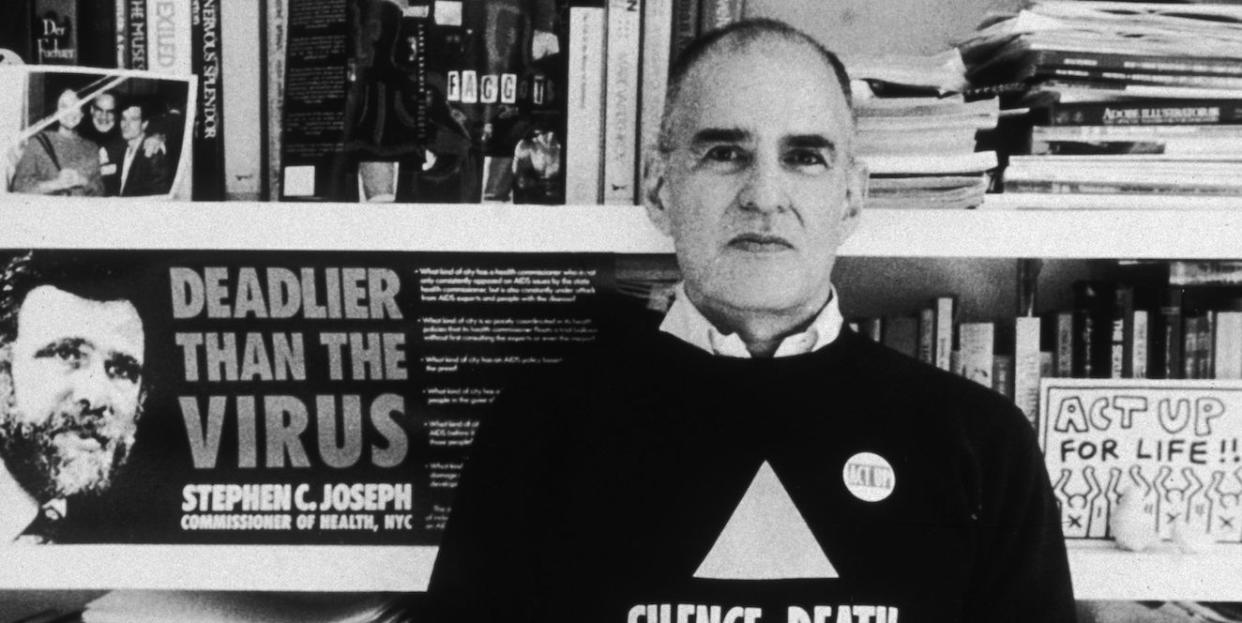Larry Kramer and Anthony Fauci Sparred During the AIDS Crisis. In the End They Were Friends.

Larry Kramer, the playwright and novelist whose heroic campaign to end the AIDS crisis shifted public policy in the 1980s and 1990s, has died of pneumonia at 84. Kramer led a distinguished life not just in letters, but in political activism, confronting the government’s inaction on the AIDS crisis and earning the title from Susan Sontag of “one of America’s most valuable troublemakers.”
In 1981, Kramer co-founded the Gay Men’s Health Crisis, a non-profit organization that has since become the world’s largest health organization assisting those living with AIDS. Kramer’s righteous anger led him to be perceived as something of a firebrand, while his view that gay men should stop having frivolous sex so as to prevent the disease’s spread made him unpopular even among his GMHC colleagues, who effectively ejected him from the organization a year into its mission. Kramer went on to found ACT UP (Aids Coalition to Unleash Power), whose street demonstrations demanding action from the government disrupted public life everywhere from churches to offices to statehouses. Kramer’s confrontational approach was perceived by some, even those who shared his goals, as needlessly incendiary, yet others believed that his shocking demonstrations were the only way to jolt an ignorant country into action.
In 1985, Kramer published his best known work: The Normal Heart, an autofictional play about a writer and activist named Ned Weeks, who rages against government inaction while caring for his ailing lover, who is slowly dying of AIDS. The Tony Award-winning play has been reproduced around the world over 600 times, and it lives in the annals of American drama as one of the great American plays. During the 2011 revival of The Normal Heart, Kramer would stand outside the theater distributing pamphlets that took aim at American politicians for their failure to address to the AIDS crisis: “Please know that beginning with Ronald Reagan (who would not say “AIDS” publicly for seven years), every single president has said nothing and done nothing, or in the case of the current president, says the right things and then doesn’t do them.”
Larry Kramer never let up, to the point where during the revival of The Normal Heart he would stand outside the theatre handing out these fliers to audience members after performances- his dying is like an astonishing loss pic.twitter.com/FG1wSaYHKO
— Will Kellogg (@Will_Kellogg) May 27, 2020
Kramer’s legacy of activism in addressing the defining public health crisis of the late twentieth takes on new meaning in the age of another pandemic. Dr. Anthony Fauci, the director of the National Institute of Allergy and Infectious Diseases, who has publicly sparred with President Trump, is a former adversary of Kramer; in fact, in 1988, Kramer published an open letter calling him a killer and “an incompetent idiot.” Yet as the years passed, Fauci credited Kramer with showing how the federal bureaucracy was slowing the search for a treatment to HIV and AIDS. In 2002, Fauci said, “There is no question in my mind that Larry helped change medicine in this country.”
In recent years, Fauci and Kramer developed a reluctant friendship, particularly after Kramer underwent a liver transplant in 2001 with Fauci’s help in securing lifesaving experimental drug therapy. As recently as March of this year, Kramer said of Fauci, “We are friends again. I’m feeling sorry for how he’s being treated. I emailed him this, but his one line answer was, ‘Hunker down.’”
Kramer leaves behind not just a masterful body of plays, novels, and letters, but an astounding impact on the trajectory of American history.
You Might Also Like

